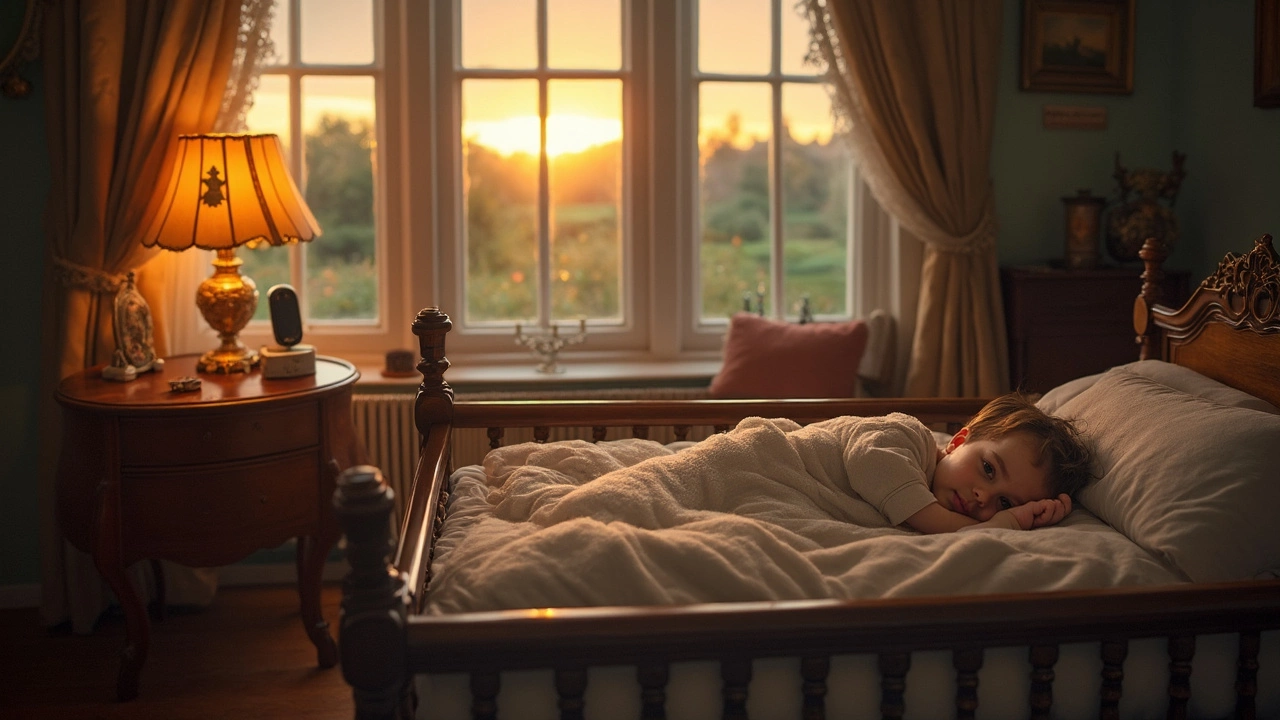Alright, so you've got your little one sleeping right next to you. Do you really need a baby monitor? Seems a bit extra, doesn’t it? The funny thing is, even when the crib's just a few feet away, a monitor can sometimes be the unsung hero in the parenting game. But before you throw money at another gadget, let's think it through.
The biggest perk of having a monitor in your room? Convenience. Imagine you’re out of bed, grabbing a snack or scrolling your phone on the couch. A monitor lets you keep eyes (or ears) on the baby without tip-toeing back to the room. It’s like having a third eye, if you will.
Yet, let's be real, not everyone thinks this is must-have territory. Some folks argue it's overkill. With your baby sleeping in the same space, you might already notice any hiccups or disturbances. And there's the cost—monitors, especially the fancy ones, aren't always cheap.
Basic Need for a Monitor
So, you're pondering the basic need for a baby monitor when your baby sleeps just a few steps away in your room. The first thing to ask yourself is what you actually need it for. It might seem like overkill at first glance, but there are legitimate reasons behind it that you might not have considered yet.
Let's start with safety. While you’re snoozing away blissfully, it’s comforting to know that a monitor can keep tabs on your baby’s sleep patterns, breathing, and any weird noises that might crop up. Even with room-sharing, it’s possible to miss subtle cues when you’re sound asleep or deeply focused on something else.
Night-Time Peace of Mind
A big plus of using a baby monitor is peace of mind during the night. If your baby is prone to stirring or making little quiet sounds that might go unnoticed until they become full-blown cries, a monitor acts like an early warning system.
Some fancy models come with motion sensors and offer alerts for changes in room temperature, which is handy to ensure your little one doesn’t get too hot or cold. According to a 2023 review, about 75% of parents felt more at ease during the night with a monitor, even with the baby right there.
Daytime Benefits
But hey, it's not just a nighttime thing. Imagine it’s daytime, and you haven’t mastered the art of doing everything one-handed yet. You might step away, maybe for a quick shower or a five-second breather. With today's video monitors, you can do these things without having a mini heart attack every time you can't see the baby directly.
While room-sharing means you’ll likely wake up from the slightest sound, it’s always wise to weigh in on the convenience, peace of mind, and the specific needs of your parenting style. After all, every parent and every baby is different, and what works wonders for one might not for another.
Benefits of Having a Monitor
Choosing to have a baby monitor in the room might sound a bit like keeping tabs on what’s already right next to you, but there are some good reasons to consider it. Let's break it down.
First off, let's talk about night-time escapes. Ever been nervous about leaving the room, whether it's to grab a midnight snack or take a bathroom break? A baby monitor can be your trusty sidekick, ensuring you don't miss a peep. Sometimes, what we crave is reassurance that lets us actually relax when those tiny snores hit.
Peace of Mind
One major plus is the peace of mind it offers. Even though your baby is nearby, knowing you have a device tuned into every giggle, sneeze, or sigh can help put your worries at ease. It helps more than you think when you're not craning your neck for every sound during those power naps when the baby's asleep.
Easier Monitoring of Sleep Patterns
A monitor also gives you a peek into your baby's sleep cycles and patterns. This can be handy if you're a data geek who's into checking how long those naps really last or want insight into their sleep habits. Catching these patterns early on can help shape a solid sleep routine later.
Extra Features
And let's not ignore the techie perks: some monitors come with extra features like room temperature displays and two-way talk functions, which can be a real bonus. Who doesn't love gadgets that multitask, right?
For those who dig numbers, here’s a quick fact: An estimated 70% of new parents in the U.S. use some type of baby monitor, according to a 2024 survey. These users typically cite convenience and peace of mind as the top reasons.
In the end, using a monitor can mean less running back and forth while ensuring your little one is cozy and sound. It’s about striking that balance between being attentive and slightly less helicopter-like in those earliest months.

Potential Downsides
Let's talk about why a baby monitor might not be all it’s cracked up to be, especially when your baby’s right there in the room with you.
The Cost Factor
First up, the dollars and cents. High-tech monitors can be pricey, and you might start thinking if it's really worth the extra cost. Sure, they have all these nifty features like night vision and motion sensing, but when you’re room-sharing, those might not be essential. It could be money better spent on diapers or, say, that extra-large coffee you probably need.
Sleep Interference
Here's a twist: sometimes more tech equals less zen. Monitors can sometimes end up being sleep disruptors. They amplify every tiny noise, so you might find yourself waking up for every little coo or shuffle. Dr. James Anston, a pediatric sleep expert, says it best,
"Over-relying on a baby monitor, even in the same room, can lead to unnecessary anxiety and poorer rest for parents."
Over-Dependence
There’s also the dependency factor. Constantly checking the monitor might become a habit, making it tough to relax and trust your instincts. Parenting, especially with a newborn, is already a lot. Adding more devices to watch can just pile on the stress.
Plus, think about the unplugged moments. Monitors, particularly those with video feeds, could make you obsess over the tiniest things. Sometimes you really shouldn't sweat the small stuff, but the monitor might have you second-guessing whether that yawn was just a typical yawn.
Alternatives and Tips
If you're on the fence about investing in that baby monitor, here are some useful alternatives and handy tips to make life easier with your little roommate.
Keep It Simple
Sometimes, the best tools are the basic ones. A good ole-fashioned routine can be your best friend. Try setting up a regular nighttime regimen that helps both you and your child get settled. This means dimming the lights and switching to low noise activities before sleep.
Effective Sleep Arrangements
Placing the baby’s crib close enough that you can hear them but far enough that you're not waking up at every teeny sound can be a game-changer. Often, parents find that they naturally pick up on baby's patterns and cues with ease.
Baby Monitor Alternatives
- Sound Machines: These can help mask random noises, aiding your baby’s—and your—sleep. Look for ones with various settings, from white noise to nature sounds.
- Baby Breathing Monitors: If you're really worried about safety, some parents use wearables that alert them about breathing patterns, a step more affordable than a full-blown monitor setup.
Trust Your Instincts
In the end, remember that your intuition as a parent is one of your best tools. You'll sense when your baby needs you, sometimes even without technology.

